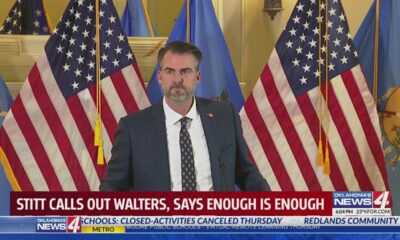Mississippi Today
‘Let us do our jobs’: Mississippi universities growing weary of Trump’s crusade on diversity

Faculty, staff and administrators at Mississippi’s colleges and universities are growing increasingly weary of the Trump Administration’s crusade against diversity, equity and inclusion in higher education.
The far-reaching memos, directives and executive orders, issued at a rapid pace in the first month of Donald Trump’s presidency, have roiled campuses across the country and in Mississippi.
As one professor put it: “Can you please just let us do our jobs?”
It’s unlikely the chaos and confusion will end anytime soon. Last week, the U.S. Department of Education Office of Civil Rights issued a sweeping memo declaring virtually all race-based programming and admissions policies illegal. This applies to all aspects of student, academic and campus life, including admissions, hiring, financial aid, campus cultural centers, housing and graduation ceremonies.
“Put simply, educational institutions may neither separate or segregate students based on race, nor distribute benefits or burdens based on race,” wrote Craig Trainor, the acting assistant secretary for civil rights under Trump.
Schools, community colleges and universities have two weeks to comply with the directive or risk losing federal funding that supports research, student financial aid and other institutional operations.
The department issued the directive, an expanded interpretation of the recent Supreme Court decision overturning affirmative action in college admissions, in the form of a “Dear Colleague” letter, a document that federal agencies use to issue new or updated legal interpretations. It is not a new regulation or law and is certain to face legal challenges, according to Inside Higher Ed.
That’s what some universities across the country are waiting for, while others have scrubbed their websites and changed programming, according to national reporting.
“It’s meant to create chaos in higher education, and in that it’s been successful,” Todd Wolfson, the president of the American Association of University Professors, told the New York Times. “The responses are all over the map.”
In Mississippi, universities do not use race-conscious admissions standards, the result of a historic settlement to desegregate the state’s higher education system.
But many of the universities have offered scholarships for underrepresented students and sponsored multicultural student organizations. Black student unions have existed for decades in Mississippi. These clubs are often funded through student fees, not state appropriations.
Still, it remains to be seen how the directive will affect higher education in Mississippi. Most faculty are hesitant to speak on the record for fear of seeming political. And the administrations are not speaking out, either. Every university contacted for this story did not respond to questions about if they planned to comply with the directive or what programming would be affected.
“The university is aware of the Department of Education’s recent ‘Dear Colleague’ letter and is reviewing how it may affect our campus,” a University of Mississippi spokesperson wrote in an email.
A spokesperson for the Institutions of Higher Learning Board of Trustees wrote in an email that the board is aware of the directive “and will await further legal guidance from the Department as noted in the letter.”
The University of Mississippi Medical Center’s communications director wrote in an email that “I believe IHL has responded to you on behalf of the system.”
“I understand that John Sewell provided you with a response from IHL, which we echo,” the University of Southern Mississippi wrote in an email.
Despite the widespread anxiety, faculty at some Mississippi universities are facing problems of a more local nature.
At the University of Southern Mississippi, the anxiety churned up by recent program cuts is taking precedence over national politics.
“We’re aware of the other thing,” said Jeremy Scott, the president of USM’s AAUP chapter.
This article first appeared on Mississippi Today and is republished here under a Creative Commons license.![]()
Mississippi Today
Senate advances its tax overhaul. Debate centers on who the proposal would help

The Senate Finance Committee voted Thursday to advance legislation to reduce the state income tax and the sales tax on groceries while raising the gasoline tax.
Republican senators voted to advance the measure, which they say will boost economic activity in Mississippi. Democrats on the committee argued cutting the income tax while raising the gas tax would benefit corporations and harm the working poor.
The Senate plan amounts to a net tax cut of $326 million, a more modest sum than the $1.1 billion net cut passed by the House. The Senate would reduce the state’s flat 4% income tax to 2.99% over four years, a provision that’s likely to become a point of contention with the House, which has pushed for eventual full elimination of the income tax.
If Mississippi were to adopt the House plan, it would join nine other states that don’t have a state income tax. The Senate proposal to maintain the income tax but lower it to 2.99% would make Mississippi’s income tax the nation’s third-lowest, according to Senate Finance Chairman Josh Harkins, a Republican.
Harkins, the Senate plan’s lead author, said the legislation would help Mississippi draw corporate investment and attract new residents migrating from higher-tax states.
“While it may not be only tax policy, it’s tax policy coupled with regulation and things that induce people to move into the state,” he said. “But it’s part of the equation, and I think that’s the effort that we’re all trying to get here.”
The Senate proposal would also reduce the state’s 7% sales tax on grocery items, the highest in the nation, to 5% starting July 2026.
The Senate would raise the state’s 18.4-cents-a-gallon gasoline excise by three cents each year over the next three years, eventually resulting in a 27.4 cents per gallon gas tax at completion. This is an effort to help the Mississippi Department of Transportation with a long-running shortfall of highway maintenance money.
Democratic Sen. Hob Bryan said the Republican majority’s “obsession” with abolishing or lowering the income tax was being driven by out-of-state corporations and anti-tax activists such as Grover Norquist, who famously said his goal was to shrink government to the size “where we can drown it in the bathtub.”
READ MORE: Speaker White frustrated by ‘crickets’ from Senate on tax plan
“The people who are driving this, the ones who actually know what they’re doing, I’m not talking about the useful idiots,” Bryan said. “They care nothing about roads. They care nothing about water. They care nothing about sewer. They care nothing about public safety. They care nothing about public schools. What they care about is simply reducing government to the size that it could be drowned in a bathtub, as an end in and of itself.”
The debate over tax policy is unfolding as Mississippi has made a push to lure technology companies to the state with generous tax incentives. Republican Sen. Daniel Sparks said the Senate plan would strengthen the state’s effort to create jobs and attract new residents.
“No, I don’t think if you go to zero income tax people are lined up at the state line ready to spring into Mississippi. I’ll concede that point to you,” Sparks said. “But good tax policy brings business, which brings jobs, which brings opportunity.”
Bryan said most people don’t choose where to live based on tax policy. He said the Senate and House tax overhauls would lead to the defunding of public services and shower benefits on corporations instead of workers.
“The tax structure in Mississippi is geared toward making life worse and worse for (the working poor) and shifting more and more of the tax burden to them,” Bryan said.
The Senate announced its plan after the House passed a plan last month that eliminates the income tax over a decade, cuts the state grocery tax and raises sales taxes and gasoline taxes.
In a bid to increase economic development, Republican Gov. Tate Reeves has made the full elimination of the state income tax his central legislative priority this session.
It remains unclear if Reeves would sign a tax cut package into law that does not fully eliminate the income tax.
The Senate bill now goes to the floor for a vote before the full chamber.
This article first appeared on Mississippi Today and is republished here under a Creative Commons license.![]()
Mississippi Today
Editorial: Someone needs to read the First Amendment to Judge Crystal Wise Martin

Note: This editorial is part of Mississippi Today Ideas, a new platform for thoughtful Mississippians to share fact-based ideas about our state’s past, present and future. You can read more about the section here.
“Congress shall make no law respecting an establishment of religion, or prohibiting the free exercise thereof; or abridging the freedom of speech, or of the press; or the right of the people peaceably to assemble, and to petition the Government for a redress of grievances.”
First Amendment of the U.S. Constitution
In the United States of America, we are free to criticize government, from city hall to the White House.
This somewhat peculiar freedom enshrined in the First Amendment is the bedrock of our republic, and many have argued it’s the wellhead from which all our other freedoms flow. The British Crown’s use of “sedition” laws to put down dissent is a key reason we rose up and threw that yoke, and have a First Amendment, and a country.
Someone needs to remind Hinds County Chancellor Crystal Wise Martin of this fundamental of American democracy. And of a few points of law.
Martin has issued a ruling that appears so unconstitutional, so anathema to accepted jurisprudence and so un-American that she’s drawing attention and criticism nationwide and abroad.
Without even granting the newspaper a hearing, Martin issued a temporary restraining order against the Clarksdale Press Register after city officials sued. She ordered the newspaper to take down a Feb. 8 editorial “Secrecy, Deception Erode Public Trust” from its online site and make it inaccessible to readers.
Without. A. Hearing.
The editorial criticized city of Clarksdale officials for not providing the paper notice of a meeting, and it questioned city leaders’ motives in asking the state Legislature to allow creation of a local tax on alcohol, marijuana and tobacco.
Will they add tea?
City leaders did not like the editorial and sued, claiming it was libelous and hindered their efforts to lobby lawmakers for the tax.
Prior restraint of speech before adjudication that it is not protected has long been held unconstitutional, dating back early in U.S. law.
And besides the inherent wrongness of a Soviet-style censorship order without granting due process to the newspaper, it has also been long and widely held in U.S. law that a government cannot sue for defamation or libel.
As was noted in the case of the City of Chicago v. Tribune Co. in the early 1920s, “no court of last resort in this country has ever held, or even suggested, that prosecutions for libel on government have any place in the American system of jurisprudence.”
But even more astounding, even if the city of Clarksdale did have the right to sue for libel, the city clerk admitted in court filings that she failed to notify the newspaper as required of the meeting.
As longtime Mississippi editor, columnist and attorney Charlie Mitchell said, there are so many things wrong with this ruling, it’s hard to know where to start.
Our nation’s founders despised and feared tyrannical government that brooks no redress from those governed or from a free press. And the people and the free press have the right to criticize government be it at Clarksdale City Hall or in Washington, D.C.
This article first appeared on Mississippi Today and is republished here under a Creative Commons license.![]()
Mississippi Today
Hinds County judge orders Clarksdale newspaper to remove editorial, alarming press advocates

A Mississippi judge ordered a newspaper to remove an editorial criticizing the mayor of Clarksdale and city leaders after the officials sued the news outlet, leading press advocates to criticize the order as one of the most egregious First Amendment violations in recent years.
Without a hearing for the newspaper, Hinds County Chancellor Crystal Wise Martin issued a temporary restraining order against the Clarksdale Press Register on Tuesday after the news outlet wrote a Feb. 8 editorial titled “Secrecy, Deception Erode Public Trust.”
The column criticized the city for not sending the newspaper a notice about a meeting city commissioners held over a proposed effort to ask the state Legislature for permission to enact a local tax on alcohol, marijuana and tobacco.
As of Thursday morning, the news outlet had removed the editorial from its website, but Wyatt Emmerich, the newspaper’s owner, told Mississippi Today that he intended to fight the judge’s order in court, which he called “absolutely astounding.”
“There wasn’t a hearing over this or anything,” Emmerich said. “We haven’t even been served with process.”
Clarksdale Mayor Chuck Espy, a Democrat, and the Board of Commissioners filed the petition in Hinds County, calling the editorial “libelous’ and saying the editorial would bring “immediate and irreparable injury” to the city.
“(The editorial’s) statements could be reasonably understood as declaring or implying that the ‘deceptive’ reason he was not given notice of the meeting is provable through someone in the community willing to reveal promises made by the Board members in exchange for votes or in the process of time,” the city’s petition reads.
The litigation stems from a special-called meeting the board conducted. State law requires public bodies to post a notice of a special meeting in a public place and on the city’s website, if they have one, at least one hour before the meeting.
The state’s Open Meetings Act also requires public bodies to email a notice of the meeting to media outlets and citizens who have asked to be placed on the city’s email distribution list.
The Clarksdale city clerk, Laketha Covington, filed an affidavit saying she did post the meeting notice at City Hall. However, she admitted she forgot to send out an email notice about the special meeting but that it was a simple mistake and not intentional.
Charlie Mitchell is the former executive editor of the Vicksburg Post and is an attorney. He is an assistant professor at the University of Mississippi’s School of Journalism and New Media, where he has taught media law for years. He told Mississippi Today there were so many issues with the judge’s order that he didn’t even “know where to start.”
The municipality is suing the media outlet over defamation, which is typically used when individuals or businesses believe their reputation has been harmed. But government bodies, according to Mitchell, are “defamation-proof and always have been.”
“The First Amendment allows restraint of expression, including by the media, only extremely rarely and only when there is clear evidence of immediate and irreparable risk to the public — such as blocking publication that would identify confidential informants,” Mitchell said.
For decades, state and federal courts have held that news outlets criticizing government actions through editorials are protected speech. But there have been attempts to silence local news outlets in recent years.
In 2023, a Kansas police department raided a newspaper’s office and its owner’s home after alleging the outlet potentially committed identity theft over its report on a local business owner’s driving record.
Layne Bruce, the executive director of the Mississippi Press Association, wrote in a statement that the organization’s leadership stands with the newspaper and is strongly opposed to the judge’s order.
“The Press Association feels this is an egregious overreach and that it clearly runs counter to First Amendment rights,” Bruce said
The judge scheduled a full hearing on the litigation for 9:30 a.m. on February 27.
This article first appeared on Mississippi Today and is republished here under a Creative Commons license.![]()
-

 News from the South - North Carolina News Feed6 days ago
News from the South - North Carolina News Feed6 days agoPancreatic cancer diagnosed in Black patients during advanced stages
-

 News from the South - North Carolina News Feed7 days ago
News from the South - North Carolina News Feed7 days agoThree charged, including two attorneys, in Buncombe real estate deals • Asheville Watchdog
-

 News from the South - North Carolina News Feed7 days ago
News from the South - North Carolina News Feed7 days agoCleveland County faces lawsuit after LGTBQ+ ban on school club
-

 News from the South - Oklahoma News Feed5 days ago
News from the South - Oklahoma News Feed5 days agoStitt calls out Walters, says enough is enough
-

 News from the South - South Carolina News Feed6 days ago
News from the South - South Carolina News Feed6 days agoCommunity helps solve killing at Florence night lounge
-

 News from the South - North Carolina News Feed4 days ago
News from the South - North Carolina News Feed4 days agoModest drops in some North Carolina prices under Trump | North Carolina
-

 News from the South - North Carolina News Feed6 days ago
News from the South - North Carolina News Feed6 days agoEnormous — and controversial — I-26 bridge over Patton Avenue, nixed years ago, is quietly revived in Connector plan • Asheville Watchdog
-

 News from the South - Oklahoma News Feed7 days ago
News from the South - Oklahoma News Feed7 days agoFriday Feb. 14, 2025 Forecast: Oklahoma to see cold breeze today













































